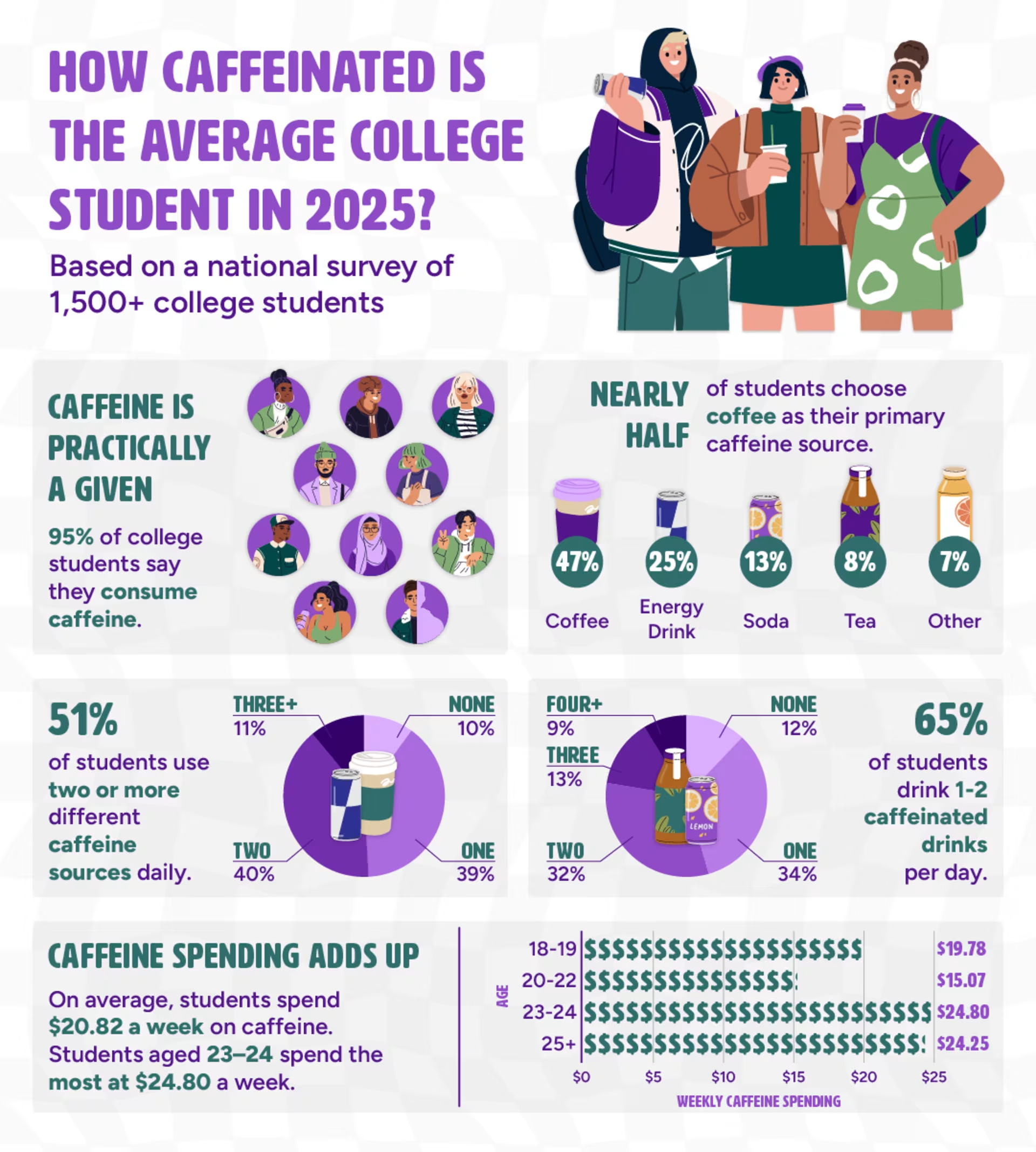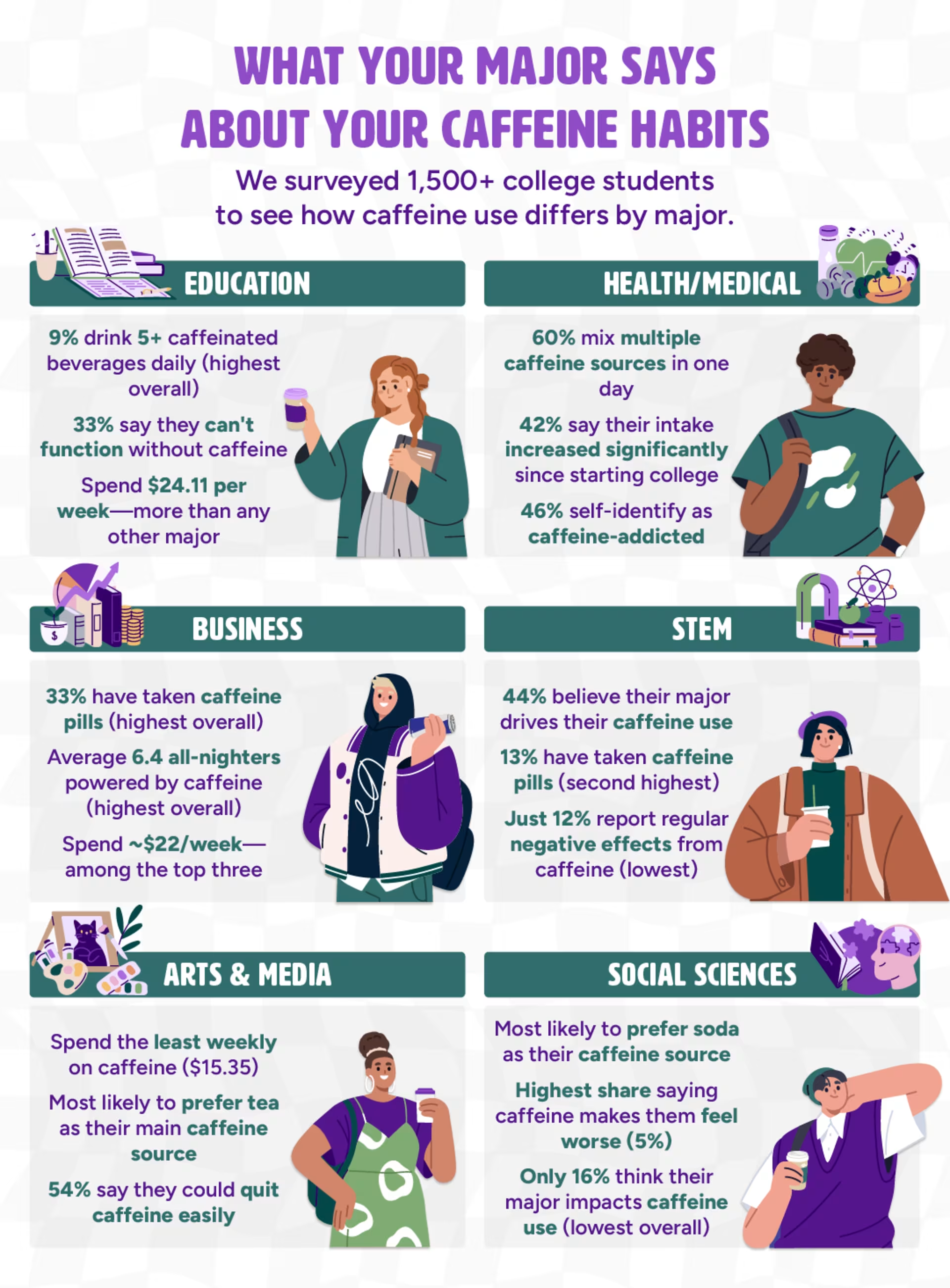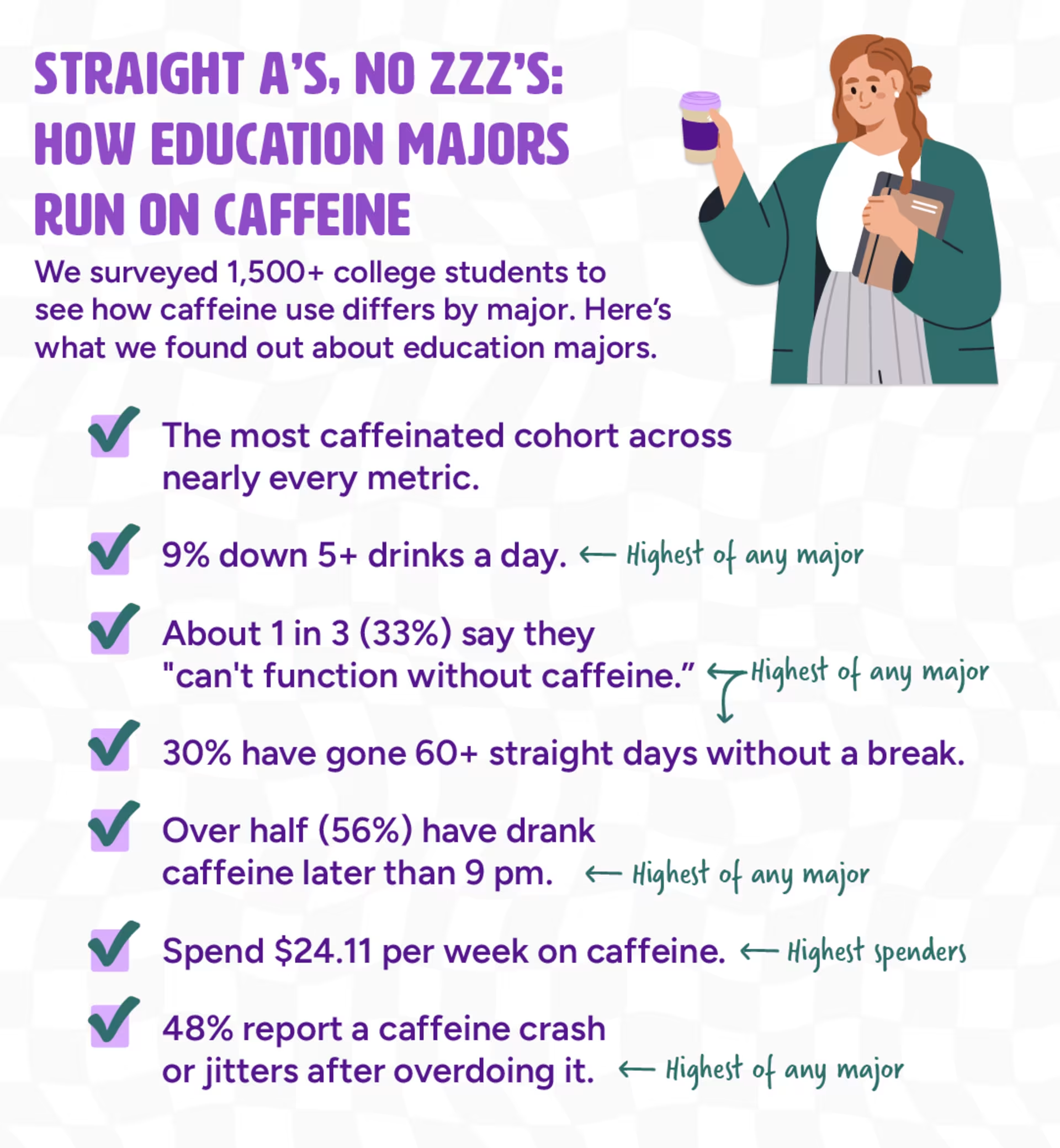In the soft hum of a campus library at 2 am, a college student taps at their laptop with one hand and clutches a half-empty Red Bull with the other. For many, this isn’t an unusual scene — it’s part of the routine. Whether it's prepping for an exam, pushing through a term paper or trying to stay alert during early-morning classes, caffeine has become a core companion in the daily life of students navigating higher education.
But how much caffeine is too much? What are students reaching for — coffee, soda, energy drinks — and how do these habits vary by age, gender and college major? Most importantly, how is this reliance on caffeine shaping student well-being?
In this article, we dive into caffeine consumption across U.S. campuses in 2025, uncovering the habits, health effects and behavioral trends among today's college students. Based on a national survey of more than 1,500 college students from all 50 states and across 174 unique majors, the data provides a compelling snapshot of how students are staying energized, and what that means for their sleep, spending and success.
What Does the Average College Student’s Caffeine Consumption Look Like?

In 2025, caffeine is woven into the daily rhythm of campus life. Our nationwide survey found that 95% of college students consume caffeine in some form, leaving just 5% who say they abstain entirely. Whether it’s for a late-night studying session or an early class, caffeine is a go-to tool for managing energy and productivity.
Coffee stands out as the top choice, with 47% of students naming it their preferred caffeine source. Energy drinks follow at 25%, while 13% turn to soda and 8% choose tea. Only less than 4% rely on caffeinated snacks or supplements, showing that traditional beverages still dominate student preferences. Older students — particularly those aged 25 and up — are the most loyal coffee drinkers, with 52% choosing it as their primary source. Meanwhile, the youngest age group (18–19) shows a slight edge toward energy drinks (26%).
Gender differences also play a role. Men are more likely than women to favor energy drinks (28% vs. 23%) while women are slightly more inclined to choose tea (8% vs. 6%).
When it comes to how much caffeine students consume, 34% report having one caffeinated beverage each day, while 66% say they typically drink one to two. 12% don’t consume caffeine on the daily, but a dedicated 4% consume five or more drinks per day — a number that climbs to nearly 10% among students aged 25 and older. Notably, men are twice as likely as women to fall into this high-consumption bracket (6% vs. 3%).
But it’s not just about volume — it’s also about variety. Nearly 40% of students said they consume two different sources of caffeine in a typical day, such as pairing coffee with soda or energy drinks with pre-workout. Another 39% stick to just one source (such as only drinking coffee drinks) and a smaller, high-intensity group — 11% — admit to using three or more different types of caffeinated substances regularly. Women are more likely than men to report dual-source usage (43% vs. 36%).
As for spending, the average college student reports allocating $20.82 per week to caffeinated beverages. Students aged 23 to 24 spend the most, averaging $24.80 per week, closely followed by those 25 and older at $24.25. The thriftiest group is the 20 to 22 age range, who spend about $15.07 weekly. Gender differences appear here, too; men spend slightly more than women on caffeine each week ($22.73 vs. $20.09).
The Perks and Pitfalls of College Student Caffeine Use

When it comes to academic performance, caffeine is widely seen as a booster. According to our data, 40% of students believe caffeine helps them both focus and perform better in class. These benefits appear even more pronounced among older students — 43% of those aged 23 to 25 and up say caffeine sharpens their academic edge, compared to only 31% of 18 to 19-year-olds. Men were especially likely to credit caffeine for improved performance, with 45% reporting a positive impact.
Still, the perks aren’t universal. 27% of students acknowledge a short-term benefit in focus but then say it’s followed by a crash. Another 25% say caffeine doesn’t influence their academic ability at all. Only 3% reported feeling worse academically due to caffeine, making that a rare minority.
Beyond academics, students are grappling with a mix of side effects. Three in four (75%) say they’ve experienced negative effects from caffeine, such as jitters, anxiety or crashes, though only 14% say this happens regularly. Women reported these side effects more frequently, with 65% experiencing them occasionally compared to 55% of men. On the flip side, 25% of students claim they’ve never had any adverse reactions.
The impact on mental health is more nuanced. A quarter of students (24%) believe caffeine has negatively affected their mental well-being, while nearly half (47%) say it hasn’t. The remaining 29% responded with “maybe,” underscoring the ambiguity many feel about caffeine’s long-term effects. Women were slightly more likely than men to report mental health consequences (26% vs. 20%).
Caffeine also fuels many students through intense academic demands. The average college student has pulled 5.3 all-nighters powered by caffeine. For students aged 25 and older, that average climbs to 7.2, while younger students report just two. Men edge out women slightly with 5.9 vs. 5.0 all-nighters, respectively.
Then come the extremes: 37% of students have stayed awake for 24 hours or more with the help of caffeine and 39% have experienced crashes or jitters from overdoing it. Another 36% admit to drinking multiple energy drinks in a single night, while 12% have used caffeine pills to stay awake. Only 19% say they’ve never had an “extreme” caffeine moment.
Whether helping them stay up, stay sharp or just survive a packed schedule, caffeine is clearly embedded in the college experience — but it's not without its risks.
Who’s the Most Energized on Campus?

Not all caffeine habits are created equal, and when it comes to dependence, self-awareness and intensity, today's college students span a wide spectrum. From casual consumers to self-identified addicts, the data shows that caffeine culture on campus is both common and complicated.
The majority of students — 64% — say they enjoy caffeine but believe they could stop if they wanted to. However, a significant share of students feel more tethered to their caffeine routines: 25% said they can’t function without caffeine, a figure that jumps to 38% among students aged 25 and older. Younger students were much less likely to report this kind of dependence, with only 11% of 18 to 19-year-olds feeling they couldn’t function without it. The ever-growing awareness of caffeine dependency is also prevalent in the data, with 10% of students saying they actively avoid caffeine, and 8% saying they’re currently trying to quit.
Gender plays a role, too. Women were more likely than men to say they rely heavily on caffeine (28% vs. 19%), while men were slightly more likely to say they could quit or didn’t identify with any of the given options.
When asked directly about caffeine dependence, more than 1 in 3 students (38%) said they consider themselves addicted. Age again influences this perception — just 24% of 18 to 19-year-olds said yes, while nearly half of students aged 25 and older claimed the label. Interestingly, there was virtually no gender gap here, with men and women both hovering around the 37% mark in self-reported addiction.
The diversity of caffeine sources also increases with age. Older students — those 25 and up — are nearly three times more likely than 18 to 19-year-olds to report using three or more types of caffeine in a day. Meanwhile, younger students are five times more likely than their older peers to say they don’t consume caffeine at all. Among students aged 25 and older, 95% reported drinking at least one caffeinated beverage per day.
What Your College Major Says About Your Caffeine Habits

Caffeine isn’t just a personal preference; it might also be a reflection of your academic path. According to our survey, the intensity and type of caffeine consumption among college students vary widely depending on their college major, revealing that your field of study may say more about your energy habits than you think.
Education majors top nearly every metric in our caffeine comparison. They’re the most caffeinated cohort overall, with 9% consuming five or more drinks per day, the highest of any major group. A full 33% say they can’t function without caffeine, and 30% have gone more than 60 consecutive days without taking a break. They’re also among the top spenders, shelling out an average of $24.11 per week on their beverages of choice. Their late-night habits are notable too — 56% have consumed caffeine later than 9 pm and nearly half (48%) have experienced caffeine-related crashes or jitters.

Health and medical students aren’t far behind. This group leads in caffeine source mixing, with 60% combining multiple forms of caffeine in a single day and nearly half (48%) admit to downing multiple energy drinks in one night. Since beginning college, 42% say their caffeine consumption has spiked significantly and 46% self-identify as addicted.
Business majors are most likely to reach for a more concentrated fix; 33% have used caffeine pills and they report the highest average number of caffeine-fueled all-nighters (6.4). Their caffeine spending also places them in the top three, at $22.43 per week. This group’s habits suggest a strong drive for productivity, even at the cost of sleep.
STEM students (science, technology, engineering and math) show a more calculated relationship with caffeine. They’re the second-most likely to use caffeine pills (13%) but report the lowest rate of regular negative effects (12%). Nearly half (44%) say their major influences their caffeine intake, the highest of any other major, reflecting the demanding nature of STEM coursework and the pressure to stay sharp.
In contrast, arts and media majors appear to have the most relaxed relationship with caffeine. They spend the least on it ($15.35 per week), and 54% say they could quit easily. Still, they lead in one unique habit: 30% have consumed caffeine after midnight, making them the most nocturnal sippers. This group is also the most likely to prefer tea as their primary caffeine source (17%) and have successfully taken extended breaks from caffeine, with 36% having gone a full week or more without it.
Lastly, social science majors favor soda more than any other group (18% list it as their go-to source) and were the most likely to say caffeine makes them feel worse (5%). They also reported the lowest belief that their major affects their intake, with just 16% making a connection between their studies and their caffeine use.
Closing Thoughts
Caffeine plays a central role in the life of college students in 2025. Whether it's a quick cup of coffee, a lineup of energy drinks or the everyday soda, today’s students are constantly managing their energy levels, balancing short-term focus with long-term health.
This national study, conducted by GCU's Grand Canyon Beverage Company in collaboration with Grand Canyon Education, sheds light on the evolving culture of caffeine across age groups, genders and academic disciplines. With 95% of students reporting regular caffeine use, the data not only highlights growing reliance but also reveals important trends that colleges, students and families should consider, especially as mental health and well-being remain top priorities in higher education.
At Grand Canyon University, we understand the demands placed on the modern college student, from intense academic schedules to the pressures of career preparation. That’s why we offer programs designed to empower students through flexibility, faith-integrated learning and comprehensive campus support. Whether you're interested in healthcare, education, business or STEM, we provide the tools to help you manage the journey, without running on empty.
Ready to discover your purpose? Explore our degree programs today and see how we can help keep your academic journey both meaningful and sustainable.
Methodology for Surveying College Student Caffeine Habits in 2025
To understand how college students across the U.S. are consuming caffeine in 2025, we surveyed over 1,500 current undergraduate students between the ages of 18 and 25+. Respondents were located in all 50 states and represented 174 unique majors, which we categorized into six broader academic groups: Arts and Media, Business and Economics, Education, Health and Medical, Social Sciences and Humanities and STEM. The survey asked students about their daily caffeine consumption, preferred sources, spending habits, motivations, side effects and more. Responses were collected in April 2025 and analyzed to identify trends by age, gender and major group.






